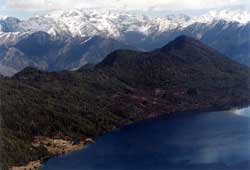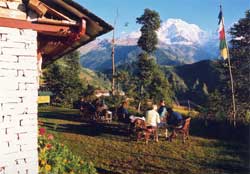 The government has decided to hand over the management of some of Nepal's national parks to non-government and private groups, bringing howls of protest from conservationists. It has also driven a wedge within the environment protection bureaucracy.
The government has decided to hand over the management of some of Nepal's national parks to non-government and private groups, bringing howls of protest from conservationists. It has also driven a wedge within the environment protection bureaucracy. This is not a novel idea: in the 1970s there were murmurs of following this route to reduce the financial burden on an overstretched national budget. The plan has been revived in the budget speech last month, and the seeming haste with which the Surya Bahadur Thapa government seems to have rushed into implementing it, has raised suspicions.
The Ministry of Forest and Soil Conservation (MFSC), shocked biodiversity experts and environmental groups responded last week by announcing that it was going ahead with the plan. Many are now speculating that the real motive behind the move is to parcel out choice parks like Shivapuri and Rara to private entities.
Except Royal Chitwan National Park, Royal Bardia National Park, Sagarmatha National Park, Langtang National Park and Royal Suklaphanta Wildlife Reserve, all other parks appear to be up for grabs. In total, Nepal has eight national parks, four wildlife reserves, three conservation areas, one hunting reserve and five buffer zones around national parks, covering 18 percent of the country.
Conservationists say the decision was made without consulting experts, and are concerned about the kind of organisations that will be allowed to run the national parks, whether they have any former experience, and who is going to choose them. "In-depth planning and utmost care is needed because we are talking about national parks not just forest conservation. Once we lose endangered species, it is irreversible. I wonder what the hurry is," says noted Nepali naturalist, Tirtha Bahadur Shrestha.
The government could have been inspired by the work of NGOs that have made their mark in conservation. The most notable among them is the Annapurna Conservation Area Project (ACAP), a world class eco-tourism model initiated by the King Mahendra Trust for Nature Conservation (KMTNC) and World Wildlife fund for Nature (WWF) to manage the Annapurna region. A similar model is being applied in Manaslu and Kanchenjunga.
Shrestha says national parks are not the same as conservation areas. A major difference is the involvement and active participation of locals in conservation areas. In national parks, income generation and preserving biodiversity would make for conflicting interests. "How many NGOs would be willing to invest money and dedicate themselves for the sake of conserving just three rare fish species in the 165m deep Rara Lake?" asks Shrestha.
One of the main concerns raised by conservationists is unclear phrasing in the new budget. Section 50 reads: ".interested Non-Governmental or other institutions will be provided the conservation areas." The phrase "other institutions" has raised eyebrows. Does it mean private businesses or multinational companies from India and abroad? There is special concern about the Shivapuri watershed north of Kathmandu which was declared a national park two years ago. "It is too confusing. The government has to clearly spell out what kind of agencies will be involved, and to what extent," says Keshar Man Bajracharya, president of Nepal Foresters Association.
 There is dissension within the government ranks, too. Sources say that the ministry is interfering in the work of the Department of National Parks and Wildlife Conservation (DNPWC) and undermining expertise of the biodiversity experts by making quick decisions. They say most of the rangers and junior officers were never called for consultations. "They didn't share any information with a single forester or biodiversity expert. This is reason enough to suspect the government's intentions," says forester Bishnu Acharya.
There is dissension within the government ranks, too. Sources say that the ministry is interfering in the work of the Department of National Parks and Wildlife Conservation (DNPWC) and undermining expertise of the biodiversity experts by making quick decisions. They say most of the rangers and junior officers were never called for consultations. "They didn't share any information with a single forester or biodiversity expert. This is reason enough to suspect the government's intentions," says forester Bishnu Acharya. Others are convinced this move is tailored to benefit Big Business. "The policy must have been influenced by some business groups who do not value the dignity of national parks and intend to manage these for commercial interest," says Surya Bahadur Pandey, former warden of Royal Bardia National Park. With over 28 years of experience in biodiversity conservation, Pandey, who now works at the DNPWC, says he has been reprimanded by superiors for voicing personal views contrary to government policy.
His cautious senior colleagues were unwilling to make any comments to us. "We just take orders from the ministry," one DNPWC officer said. "Talk to the ministry spokesperson," advised another. They have declined invitations to attend a series of seminars and workshops organised by other foresters and conservationists to pressurise the government both at national and international levels. "We are not getting emotional here. All we want is transparency and a clear explanation from the government as to how and where it intends to shift its huge responsibility," says Biswanath Upreti, founder warden of Royal Chitwan National Park.
Annoyed with allegations by former employees of the DNPWC, the ministry says it is tired of being made the scapegoat. "We are not handing over anything to any private sector, but to NGOs only. The so-called conservationists should stop making this a big issue," Chandi Shrestha, Secretary of MFSC, said testily. The government would not defer managerial responsibilities to an NGO unless they had experience in wildlife conservation, he said. Our national parks are not just Nepal's property but a world heritage."
"How much more transparent do they want us to be? The plan is right there, in the open, in the budget speech. We also have a working paper and anybody is welcome to come and study it," says Shrestha.The ministry contends that the controversial "other institutions" in the budget speech simply refers to international environmental NGOs.
"We have to be sure that the government is just a policy maker and it has no intention of jeopardising decades of conservation work done by our nation," says 84-year-old TJ Thapa, a hunter-turned conservationist.
But critics are not placated, and in the current unrepresentative political environment, they suspect the government of trying to sneak out the management of nature reserves to its favourite entities. When ACAP and the national zoo were handed over to NGOs, it was neither publicly announced, nor were there lengthy consultations with government officials or conservationists. The only thing that seems certain is that the government may find it more difficult than it anticipated to find an NGO or INGO capable of taking over management of our national parks.
KMTNC, WWF Nepal and IUCN are about the only bodies with any experience in the field. Chandra Gurung of WWF Nepal, who used to run ACAP, told us: "This could be a big challenge even for organisations with experience in biodiversity since they may not possess enough managerial expertise to run the national parks on their own."


